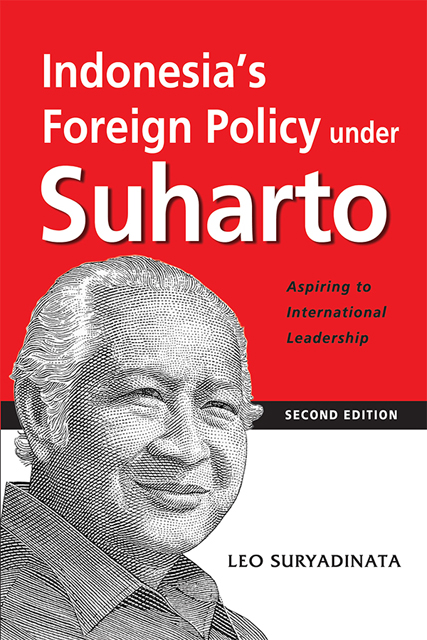Book contents
- Frontmatter
- Contents
- Preface to the Second Edition
- Preface
- Acknowledgements
- Introduction: Suharto’s Foreign Policy
- 1 Determinants of Indonesia’s Foreign Policy: In Search of an Explanation
- 2 Indonesia’s Foreign Policy before the New Order: In Search of a Format
- 3 Indonesia’s Foreign Policy during the “New Order” (I): The Rise of the Military
- 4 Indonesia’s Foreign Policy during the “New Order” (II): The Assertive Role of the President
- 5 Indonesia’s Relations with the ASEAN States: Regional Stability and Leadership Role
- 6 Indonesia’s Relations with Australia and Papua New Guinea: Security and Cultural Issues
- 7 Indonesia-China Relations: Ideology, Ethnic Chinese and the President
- 8 Indonesia-Vietnam Relations and the Kampuchean Issue: The Security Factor
- 9 Indonesia-Superpower Relations: Economic and Non-Economic Factors
- 10 Indonesia, the Middle East and Bosnia: Islam and Foreign Policy
- 11 Indonesia, the Non-Aligned Movement and APEC: In Search of a Leadership Role
- Conclusion: To Lead and Not to Be Led
- Postscript: Indonesia’s Foreign Policy from the Fall of Suharto to Joko Widodo: Still Aspiring to International Leadership?
- Bibliography
- Appendices
- Index
9 - Indonesia-Superpower Relations: Economic and Non-Economic Factors
Published online by Cambridge University Press: 01 September 2023
- Frontmatter
- Contents
- Preface to the Second Edition
- Preface
- Acknowledgements
- Introduction: Suharto’s Foreign Policy
- 1 Determinants of Indonesia’s Foreign Policy: In Search of an Explanation
- 2 Indonesia’s Foreign Policy before the New Order: In Search of a Format
- 3 Indonesia’s Foreign Policy during the “New Order” (I): The Rise of the Military
- 4 Indonesia’s Foreign Policy during the “New Order” (II): The Assertive Role of the President
- 5 Indonesia’s Relations with the ASEAN States: Regional Stability and Leadership Role
- 6 Indonesia’s Relations with Australia and Papua New Guinea: Security and Cultural Issues
- 7 Indonesia-China Relations: Ideology, Ethnic Chinese and the President
- 8 Indonesia-Vietnam Relations and the Kampuchean Issue: The Security Factor
- 9 Indonesia-Superpower Relations: Economic and Non-Economic Factors
- 10 Indonesia, the Middle East and Bosnia: Islam and Foreign Policy
- 11 Indonesia, the Non-Aligned Movement and APEC: In Search of a Leadership Role
- Conclusion: To Lead and Not to Be Led
- Postscript: Indonesia’s Foreign Policy from the Fall of Suharto to Joko Widodo: Still Aspiring to International Leadership?
- Bibliography
- Appendices
- Index
Summary
Introduction
This chapter focuses on Indonesia’s relations with the two superpowers — the United States and the former Soviet Union — as well as the economic superpower, Japan. It examines the importance of Indonesia’s “economic dependence” on the United States and Japan during the early stage of the Suharto period and its impact on Jakarta’s foreign policy behaviour. It also looks at the non-economic factors which affected Jakarta-Moscow relations before the disintegration of the Soviet Union in December 1991. In the last section of this chapter, Indonesian relations with major powers regarding regional order and security are also addressed.
Indonesia-US Relations: Convergence of Interests?
Indonesian-American relations were established during the revolutionary period when Indonesia was still fighting for its independence. Active support for Indonesia by the United States was only given after the Madiun Affair in 1948 when the Indonesian Government was under a Communist threat.
During the period of Constitutional Democracy, when the Islamic party, Masyumi, was in power, Indonesian-American relations could be described as close. An agreement on military alliance with the United States was made but it was short- lived. When Indonesian domestic politics moved towards the left and the nation’s foreign policy became even more militant and nationalistic, Indonesian-American relations deteriorated. This was also partly due to such anti-Sukarno, anti-Communist rebel groups that gained the support of the United States in their efforts to topple the central Government. The rebellions were crushed, but, as a consequence, Indonesian-American relations suffered. Meanwhile, Sukarno moved further to the left and made a formal alliance with the PRC. The nation’s relationship with the Soviet Union also became closer. The military group in Indonesia was basically anti-Communist, however, and quietly received support from the United States.
When the 1965 coup failed and the military emerged as the victor in Indonesia, Indonesian-American relations improved. The Indonesian economy before and soon after the coup was on the brink of collapse. Inflation was out of control, reaching 650 per cent annually. It was reported that, in 1966, inflation was as high as 900 per cent. The newly formed Government was aware that in order to maintain political stability, there had to be economic rehabilitation. It was also recognized that stabilizing the economy would be a way to legitimize the Suharto Government.
- Type
- Chapter
- Information
- Indonesia's Foreign Policy under SuhartoAspiring to International Leadership, pp. 138 - 157Publisher: ISEAS–Yusof Ishak InstituteFirst published in: 2023



